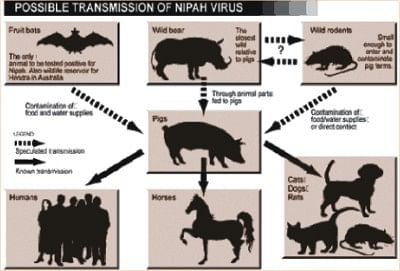Reducing the re-emergence of notorious Nipah virus

Since its first detection in Bangladesh in 2001, Nipah virus has been a cause for concern. Several human outbreaks of the virus in the region have been reported that caused significant number of mortality. As there is no specific drugs and vaccine against this virus, raising awareness of the risk factors is the only way to reduce infection.
Experts from Institute of Epidemiology, Disease Control and Research (IEDCR) informed that Nipah virus is contagious that can be transmitted from humans from animals or directly from human to human. They recommended that people should avoid close physical contact of virus infected persons.
Healthcare personnel are urged to wear gloves when taking care of ill patients and regular hand washing after caring of sick patients.
To avoid animal contacts, people should deal with sick animals or slaughtering process using proper protecting cloths. Bats and pigs are the vector for animal to human transmission. Therefore, they should be avoided.
In order to avoid the risk, experts urged farmers to avoid drinking date juice, eating half eaten fruits and should wash fruits thoroughly before eating. This virus can be inactivated by soaps, detergents and many other disinfectants.
The symptoms are influenza like — fever, headache and muscle pain. In patients who develop encephalitis (inflammation of brain tissue), the symptoms may include drowsiness, convulsions or even coma. Rarely, patients develop respiratory signs which may include atypical pneumonia, breathlessness, bleeding from the gastrointestinal tract and other complications can occur in severely ill patients.
If anyone has the above symptoms and positive contact history, s/he should consult a physician.
The writer works at Marie Stopes. E-mail: [email protected]

 For all latest news, follow The Daily Star's Google News channel.
For all latest news, follow The Daily Star's Google News channel. 



Comments